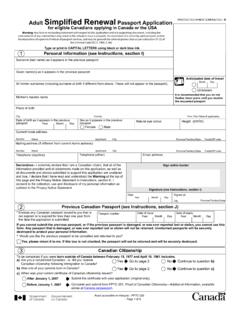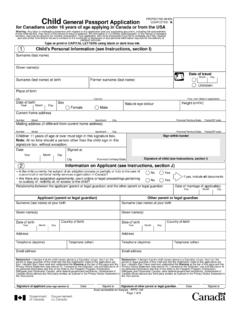Transcription of SUMMARY OF NATIONAL ADVISORY COMMITTEE ON …
1 SUMMARY OF NATIONAL . ADVISORY COMMITTEE ON. IMMUNIZATION (NACI). STATEMENT OF. JANUARY 25, 2022. Updated recommendations on the use of COVID-19. vaccines in children 5 to 11 years of age OVERVIEW. On January 25, 2022, the Public Health Agency of Canada (PHAC) released updated advice from the NATIONAL ADVISORY COMMITTEE on Immunization (NACI) regarding the use of COVID-19 vaccines in children 5 to 11 years of age. These recommendations are based on current scientific evidence and NACI's expert opinion. Canada is currently facing a fifth wave of the pandemic, largely driven by the highly transmissible Omicron variant. Children 5 to 11 years of age continue to remain at low risk of severe COVID-19 outcomes, including from the Omicron variant; however, the number of children experiencing severe disease or requiring hospitalization is increasing due to large number of children becoming infected with SARS-CoV-2 during this wave of the pandemic.
2 When updating these recommendations, NACI reviewed the available evidence on the Omicron variant, new and reassuring real-world safety data on the use of the Pfizer- BioNTech Comirnaty vaccine (10 mcg) in children, and current evidence on the use of mRNA vaccines in those who are immunocompromised. It is essential that children and their caregivers continue to be supported and respected in their decisions regarding COVID-19 vaccination. NACI has strengthened their recommendation on the use of COVID-19 vaccines in children 5 to 11 years of age. NACI now recommends: A complete series with the Pfizer-BioNTech Comirnaty vaccine (10 mcg) should be offered to children 5 to 11 years of age who do not have contraindications to the vaccine, with a dosing interval of at least 8 weeks between the first and second doses.
3 NACI now also recommends that: Children 5 to 11 years of age who are moderately to severely immunocompromised should be offered a three dose primary series of the Pfizer- BioNTech Comirnaty vaccine (10 mcg), using an interval of 4 to 8 weeks between each dose. Children 5 to 11 years of age who are moderately to severely immunocompromised who have previously received two doses of the Pfizer- BioNTech Comirnaty vaccine (10 mcg), should be offered a third dose of the Pfizer-BioNTech Comirnaty vaccine (10 mcg) 4 to 8 weeks after the second dose. To see the full update, please visit NACI rapid response: Updated recommendations on the use of COVID-19 vaccines in children 5 to 11 years of age. SUMMARY OF NATIONAL ADVISORY COMMITTEE ON IMMUNIZATION (NACI) STATEMENT OF JANUARY 25, 2022 | 2.
4 WHAT YOU NEED TO KNOW. Canada is currently facing a fifth wave of the pandemic, largely driven by the highly transmissible Omicron variant. Children 5 to 11 years of age continue to remain at low risk of severe COVID-19. outcomes, including from the Omicron variant; however, the number of children experiencing severe disease or requiring hospitalization is increasing due to the large number of children becoming infected with SARS-CoV-2. The Pfizer-BioNTech Comirnaty vaccine (10 mcg) is the only COVID-19 vaccine authorized for use in children 5 to 11 years of age at this time. The pediatric formulation of Pfizer-BioNTech Comirnaty is 10 mcg compared to the 30 mcg formulation authorized for adolescents and adults 12 years of age and older. Clinical trial data showed that in children 5 to 11 years of age, the Pfizer-BioNTech Comirnaty vaccine (10 mcg dose) has a good safety profile and produces a good immune response similar to the response seen in individuals 16 to 25 years of age who receive the adolescent/adult formulation of the vaccine (30 mcg dose).
5 Additional real-world safety data from the United States suggest the Pfizer-BioNTech Comirnaty vaccine (10 mcg) is well tolerated in children 5 to 11 years of age. o Very rare cases of myocarditis (inflammation of the heart muscle) have been reported in children 5 to 11 years of age following COVID-19 vaccination in the United States. o Data from the United States suggest the risk of myocarditis may be lower in children 5 to 11 years of age following vaccination with the 10 mcg vaccine compared to adolescents and young adults who receive the 30 mcg vaccine. o Similar to what has been seen in older age groups, data currently suggest myocarditis in children 5 to 11 years of age usually occurs within a week of vaccination, more commonly in males and more commonly after a second vaccine dose.
6 Most cases of myocarditis in both older age groups and children 5. to 11 years of age following mRNA vaccination have been mild and resolved quickly. o Myocarditis can also occur as a complication in people who are infected with the COVID-19 virus. It is essential that children and their caregivers continue to be supported and respected in their decisions regarding COVID-19 vaccination. Recommendations on the use of the Pfizer-BioNTech Comirnaty vaccine (10 mcg) in children 5 to 11 years of age In November 2021, NACI issued a discretionary recommendation that a complete series of Pfizer-BioNTech Comirnaty (10 mcg) may be offered to children 5 to 11 years of age SUMMARY OF NATIONAL ADVISORY COMMITTEE ON IMMUNIZATION (NACI) STATEMENT OF JANUARY 25, 2022 | 3.
7 Who do not have contraindications to the vaccine, with a dosing interval of at least 8. weeks between the first and second doses. NACI has strengthened its recommendation after careful consideration of the reassuring additional safety data from real-world use and evidence in older age groups that a primary series of an mRNA COVID-19 vaccine continues to offer good protection against hospitalization, including from the Omicron variant. NACI now recommends that a complete series of Pfizer-BioNTech Comirnaty vaccine (10 mcg) should be offered to children 5 to 11 years of age who do not have contraindications to the vaccine, with a dosing interval of at least 8 weeks between the first and second doses. NACI continues to recommend a dosing interval of at least 8 weeks between first and second doses.
8 An interval of at least 8 weeks gives children the opportunity to develop better and longer-lasting immunity, which will be important in future waves of the pandemic, and further minimizes the very rare risk of myocarditis following vaccination. In making this recommendation, NACI considered the current Omicron variant wave, the likelihood of future waves of the pandemic, evidence in adults that suggests longer intervals result in a stronger immune response that is expected to be longer lasting, as well as evidence that longer intervals may be associated with a lower risk of myocarditis in adolescents and young adults. Recommendations on the use of the Pfizer-BioNTech Comirnaty vaccine (10 mcg) in children who are moderately to severely immunocompromised Evidence shows that some people who are moderately to severely immunocompromised may have a reduced immune response to COVID-19 vaccines.
9 In September 2021, NACI recommended that individuals 12 years of age and over who are moderately to severely immunocompromised should receive a 3-dose primary series of an authorized mRNA COVID-19 vaccine. While there are currently no data on the safety, immunogenicity, or efficacy of an additional dose of a COVID-19 vaccine in children who are immunocompromised, studies have shown that a third dose of an mRNA vaccine leads to increased immune response in some adults who are immunocompromised. An additional dose provides another opportunity for those who are immunocompromised to develop a better immune response and in turn better protection against COVID-19. NACI now recommends that children 5 to 11 years of age who are moderately or severely immunocompromised: o should receive three doses of the Pfizer-BioNTech Comirnaty vaccine (10 mcg) if they have not yet been immunized; or o should receive a third dose of the Pfizer-BioNTech Comirnaty vaccine (10 mcg) if they have already received 2 doses of the vaccine.
10 SUMMARY OF NATIONAL ADVISORY COMMITTEE ON IMMUNIZATION (NACI) STATEMENT OF JANUARY 25, 2022 | 4. For this recommendation, moderately to severely immunocompromised includes children with the following conditions: o Active treatment for solid tumour or hematologic malignancies o Receipt of solid-organ transplant and taking immunosuppressive therapy o Receipt of chimeric antigen receptor (CAR)-T-cell therapy or hematopoietic stem cell transplant (within 2 years of transplantation or taking immunosuppression therapy). o Moderate to severe primary immunodeficiency with associated humoral and/or cell-mediated immunodeficiency or immune dysregulation o HIV with prior AIDS defining illness OR prior CD4 count 200/mm3 OR prior CD4 fraction 15% OR perinatally acquired HIV infection o Active treatment with the following categories of immunosuppressive therapies.









